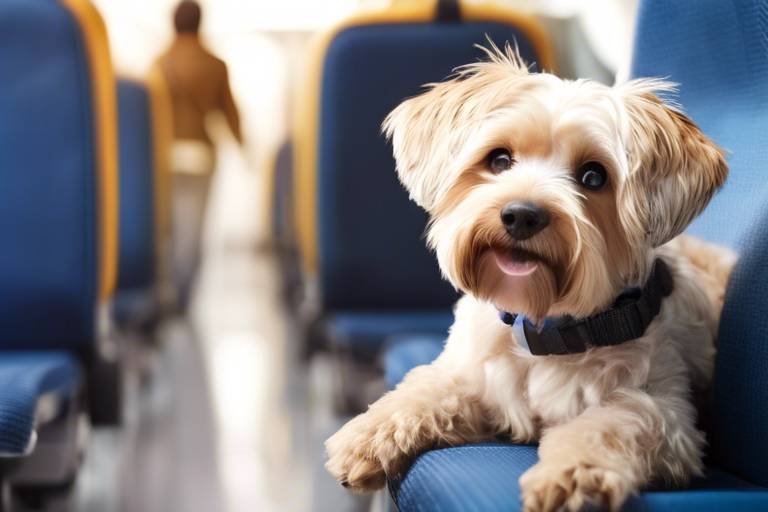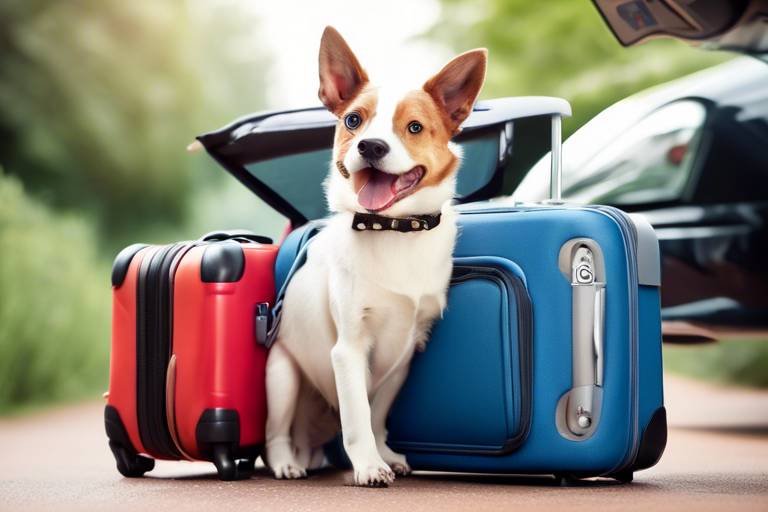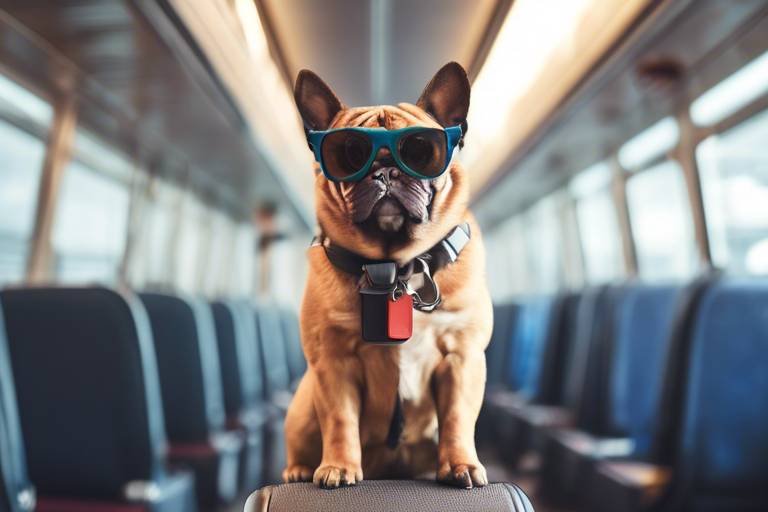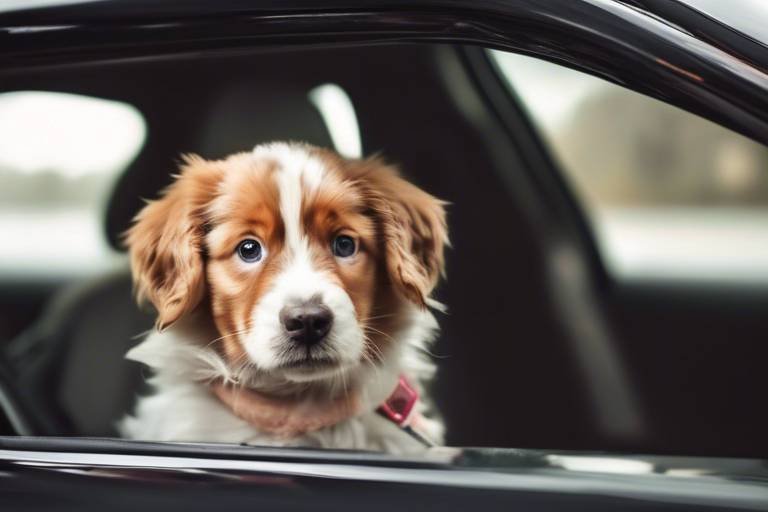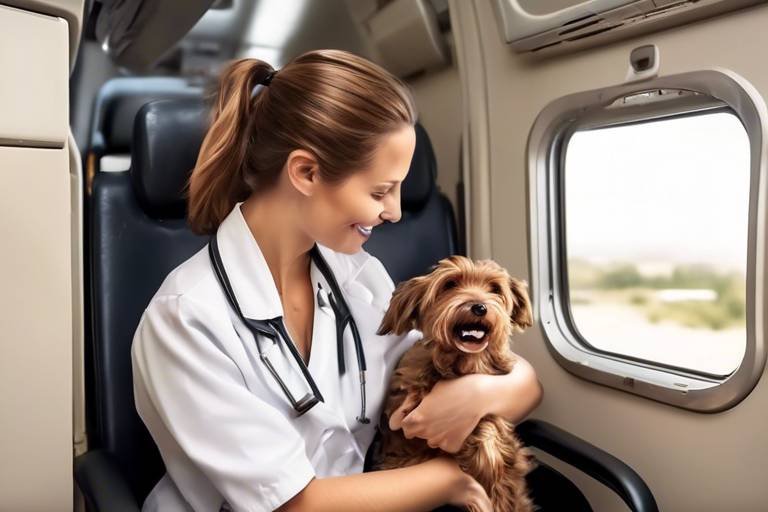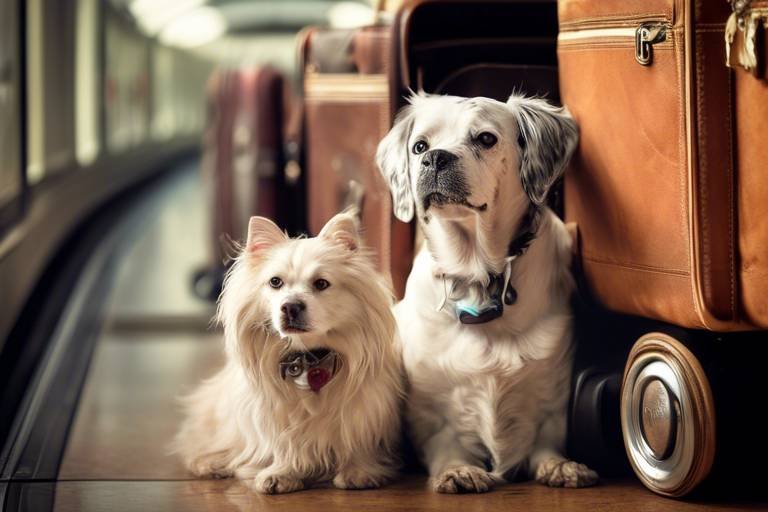Tips for Keeping Pets Safe from Travel-Related Illnesses
Traveling with your furry friends can be one of the most rewarding experiences, but it also comes with a set of challenges, especially when it comes to their health. Just like us, pets can be susceptible to various travel-related illnesses that can turn an exciting adventure into a worrying ordeal. So, how can you ensure your beloved companions remain safe and healthy while on the road? In this article, we’ll explore essential tips and strategies that every pet owner should consider before embarking on a journey. From understanding potential risks to preparing for the unexpected, we’ve got you covered!
When you think about travel, what comes to mind? New experiences, beautiful sights, and the joy of exploring the world with your pet! However, it’s crucial to recognize that traveling can expose pets to various illnesses. From exposure to unfamiliar environments to the stress of travel itself, understanding these risks is vital for pet owners. For instance, did you know that pets can catch diseases from other animals they meet during travel? By being aware of these potential dangers, you can take the right preventative measures to ensure your furry companions stay healthy throughout their journeys.
Before you hit the road, a thorough health check with your veterinarian is non-negotiable. Why? Because ensuring that your pet is in good health and up to date on vaccinations is the first line of defense against travel-related illnesses. Think of it as a pre-flight check for your pet! During this visit, your vet can assess your pet's overall condition and provide you with essential information about any necessary vaccinations or medications they might need based on your travel destination.
Administering the appropriate vaccinations and preventative medications can be a game changer for your pet's health while traveling. Just like we get travel vaccinations to protect ourselves from diseases, our pets need them too! Common vaccinations for pets include rabies, distemper, and leptospirosis, among others, depending on where you're headed. Additionally, consider preventative medications for parasites such as fleas, ticks, and worms. These little critters can pose serious health risks during travel, and the last thing you want is for your pet to come back home with unwanted guests!
Here’s a quick rundown of some essential vaccinations based on popular travel destinations:
| Destination | Recommended Vaccinations |
|---|---|
| Tropical Areas | Leptospirosis, Rabies |
| Europe | Rabies, Bordetella |
| USA | Distemper, Parvovirus |
In addition to vaccinations, administering preventative medications can effectively protect your pet from common travel-related threats. Fleas, ticks, and worms are not just annoying; they can lead to serious health issues if left unchecked. So, before you embark on your journey, make sure to consult your vet about the best preventative measures for your pet.
Proper preparation and packing are essential for a safe trip. Think of it like preparing for a big event; you wouldn’t want to forget anything important! Ensure you have all necessary supplies for your pet, including food, water, bowls, leashes, and any medications they may need. A well-packed pet travel kit can make all the difference in your pet's comfort and health while on the road. Remember, a happy pet means a happy trip!
Choosing the right transportation method is crucial for your pet's safety. Whether you're traveling by car, plane, or train, understanding the best practices can help minimize stress and exposure to illness. For instance, did you know that some airlines have specific requirements for traveling with pets? Always check the airline's pet policy ahead of time to avoid any surprises at the airport!
When traveling by car, ensuring your pet is secured in a carrier or with a seatbelt harness can prevent injuries and distractions. It’s like buckling up for safety—your pet deserves the same protection! Additionally, make regular stops for bathroom breaks and to give your pet a chance to stretch their legs. This not only helps keep them comfortable but also reduces anxiety during the journey.
Air travel presents unique challenges for pet owners. Preparing your pet for the journey can help reduce anxiety and ensure a smoother experience. Consider acclimating your pet to their carrier well before the trip, so they feel comfortable and secure. Also, ensure you have all necessary documentation, such as health certificates and vaccination records, ready for inspection at the airport.
Keeping your pet clean and maintaining hygiene during travel is vital for preventing illness. Simple practices can significantly reduce the risk of infections and other health issues on the road. Regular grooming and bathing can help keep your pet clean and free from parasites, especially in unfamiliar environments where the risk of illness is higher.
Regular grooming isn’t just for looks; it’s a crucial part of your pet’s health regimen. Bathing your pet before and after travel can help eliminate dirt, allergens, and any potential parasites they might pick up along the way. Think of it as giving your pet a fresh start before they embark on their adventure!
Cleaning up after your pet is not only courteous but also essential for maintaining hygiene. Proper disposal of waste helps prevent the spread of diseases and keeps public spaces clean. So, always carry waste bags and dispose of them responsibly. It’s a small effort that goes a long way in keeping everyone safe!
Being able to identify symptoms of travel-related illnesses is crucial for timely intervention. Understanding what to look for can help you act quickly if your pet shows signs of distress. Common symptoms to watch for include vomiting, diarrhea, lethargy, and unusual behavior. If your pet exhibits any concerning signs, don’t hesitate to reach out to a veterinarian.
Familiarizing yourself with common symptoms of illness can help you recognize when your pet may be unwell. Just like humans, pets can’t always communicate when they’re feeling off. If your pet seems more tired than usual or is refusing to eat, it might be time to consult a vet. Early detection can make all the difference in their recovery!
Knowing when to seek veterinary care is essential. If your pet exhibits concerning symptoms, acting quickly can make a significant difference in their recovery and overall health. Trust your instincts; if something feels off, it’s always better to be safe than sorry!
- What vaccinations are essential for my pet before traveling? It depends on your destination, but common vaccinations include rabies, distemper, and leptospirosis.
- How can I reduce my pet's anxiety during travel? Acclimate your pet to their carrier, take regular breaks, and keep them comfortable with familiar items.
- What should I pack for my pet when traveling? Essentials include food, water, bowls, leash, waste bags, and any medications.

Understanding Travel-Related Illnesses
Traveling with your beloved pets can be one of the most rewarding experiences, but it also comes with its fair share of risks. Just like humans, pets can be susceptible to various travel-related illnesses that can dampen the joy of your adventure. Understanding these risks is crucial for every pet owner who wants to ensure their furry companions remain healthy throughout their journeys.
When pets travel, they may encounter new environments, unfamiliar animals, and different climates, all of which can expose them to illnesses they might not face at home. For instance, a dog that usually enjoys the comforts of home can be at risk of picking up parasites like fleas, ticks, and even intestinal worms when exploring new places. Similarly, cats can be prone to respiratory infections when exposed to other animals in boarding facilities or during travel.
One of the most common travel-related illnesses is kennel cough, a highly contagious respiratory disease that can spread rapidly in places where pets congregate, such as kennels, parks, or pet-friendly hotels. Moreover, pets can also suffer from gastrointestinal issues due to changes in diet or stress during travel. Recognizing these potential health hazards is the first step in safeguarding your pets.
To better understand the types of illnesses your pets might encounter, here’s a quick overview:
| Illness | Symptoms | Prevention |
|---|---|---|
| Kennel Cough | Coughing, sneezing, nasal discharge | Vaccination, avoiding crowded areas |
| Gastrointestinal Issues | Vomiting, diarrhea, loss of appetite | Diet management, gradual food changes |
| Parasite Infections | Itching, hair loss, lethargy | Preventative medications, regular grooming |
As you can see, being aware of these illnesses and their symptoms can help you take proactive steps to keep your pet safe. It's essential to consult with your veterinarian about the specific risks associated with your travel destination. They can provide tailored advice on necessary vaccinations and preventative measures that will keep your pet healthy during your trip.
In essence, understanding travel-related illnesses is not just about knowing what might go wrong; it’s about empowering yourself to take action. By being informed and prepared, you can ensure that your pet enjoys the journey just as much as you do. So, before you pack those bags, take a moment to consider your pet's health and safety!
- What are the most common travel-related illnesses for pets? Common illnesses include kennel cough, gastrointestinal issues, and parasite infections.
- How can I prevent my pet from getting sick while traveling? Ensure vaccinations are up to date, administer preventative medications, and maintain hygiene during travel.
- When should I seek veterinary care for my pet while traveling? If your pet shows symptoms like vomiting, diarrhea, or unusual lethargy, it’s best to consult a veterinarian promptly.

Pre-Travel Health Check
Before you and your furry friend hit the road, it's absolutely essential to schedule a thorough health check with your veterinarian. Think of this as a pre-flight checklist, ensuring that your pet is healthy and ready for the adventure ahead. A quick visit to the vet can help identify any underlying health issues that could be exacerbated by travel. Plus, it’s a great opportunity to make sure all vaccinations are up to date, which is crucial for preventing any unwanted illnesses during your journey.
During this health check, your vet will likely perform a comprehensive physical examination. They'll check your pet's weight, heart rate, and overall condition. It's also a good time to discuss any specific health concerns you might have, especially if you're traveling to a region where certain diseases are more prevalent. Don't hesitate to ask about the necessary vaccinations based on your travel plans. For instance, if you're heading to a tropical area, your pet might need vaccinations for diseases like Leptospirosis or Canine Parvovirus.
Additionally, your veterinarian may recommend certain preventative medications to protect your pet from parasites that could be lurking in unfamiliar environments. Fleas, ticks, and worms can be more than just a nuisance; they can lead to serious health issues. Here’s a quick look at some common preventative medications:
| Parasite | Preventative Medication | Frequency |
|---|---|---|
| Fleas | Frontline, Advantage | Monthly |
| Ticks | Bravecto, NexGard | Every 3 months |
| Worms | Drontal, Panacur | Every 3 months |
In addition to vaccinations and medications, make sure your pet is hydrated and well-fed before the trip. A healthy diet is vital for keeping their immune system strong, which is your best defense against travel-related illnesses. If your pet is on a specific diet, pack enough food for the journey and any potential delays. And remember, a happy pet is a healthy pet! So, take a moment to give them some extra love and attention before you embark on your adventure.
Ultimately, a pre-travel health check is not just a formality; it’s a crucial step in ensuring your pet's safety and well-being while traveling. By taking these precautions, you can embark on your journey with peace of mind, knowing that your furry companion is in the best shape possible.
- How far in advance should I schedule a vet appointment before traveling? It's best to schedule your vet appointment at least 2-4 weeks before your trip to allow for any necessary vaccinations and treatments.
- What should I bring to the vet appointment? Bring your pet's vaccination records, any medications they are currently taking, and a list of any health concerns you have.
- Can I travel with my pet if they have health issues? It depends on the severity of the health issues. Consult your veterinarian for guidance tailored to your pet's specific condition.
Vaccinations and Preventative Medications
When it comes to traveling with your beloved pet, one of the most crucial steps you can take is ensuring they are up-to-date on their vaccinations and have received the necessary preventative medications. Just like humans, pets can be susceptible to various diseases, especially in unfamiliar environments. So, what vaccinations should you consider before hitting the road? Well, it largely depends on your destination and the potential exposure your pet may encounter.
For instance, if you're planning a trip to a region known for certain diseases, it’s vital to consult your veterinarian about the appropriate vaccines. Common vaccinations include rabies, distemper, and parvovirus for dogs, while cats may need feline leukemia and feline distemper vaccines. These vaccines not only protect your pet but also help prevent the spread of diseases to other animals.
In addition to vaccinations, don’t forget about preventative medications. Parasites like fleas, ticks, and worms are often lurking in new environments, waiting for their next host. Administering preventative treatments before your travels can save you from a world of trouble later on. For example, using a topical flea and tick treatment can help shield your pet from these pesky parasites, while deworming medications can protect them from intestinal worms that are more common in certain areas.
To give you a clearer picture, here’s a simple table outlining some common vaccinations and preventative medications:
| Pet Type | Common Vaccinations | Preventative Medications |
|---|---|---|
| Dogs | Rabies, Distemper, Parvovirus | Flea and Tick Treatments, Dewormers |
| Cats | Rabies, Feline Leukemia, Feline Distemper | Flea Treatments, Dewormers |
It’s essential to keep in mind that some vaccinations may require a few weeks to take effect, so planning ahead is key. Scheduling a visit to the vet well before your travel date allows you to address any health concerns and ensures your pet is in tip-top shape. Remember, a healthy pet is a happy pet, and being proactive about their health can lead to a much more enjoyable travel experience for both of you!
In summary, don’t underestimate the importance of vaccinations and preventative medications when traveling with your pet. It’s not just about keeping them safe; it's about ensuring peace of mind for you as a pet owner. After all, who wants to worry about their furry friend getting sick while trying to enjoy a vacation?
- How often should my pet receive vaccinations? - Most pets require annual vaccinations, but some may need them every three years. Consult your vet for a personalized schedule.
- Are there side effects to vaccinations? - While most pets experience no side effects, some may have mild reactions like lethargy or a slight fever. Serious reactions are rare.
- What if my pet is already sick? - If your pet shows signs of illness, it's best to postpone travel and consult your veterinarian for advice.
- Can I give my pet preventative medications myself? - Yes, but always follow your vet’s recommendations regarding dosage and frequency.
Common Vaccinations for Pets
When it comes to keeping our furry friends safe during travels, understanding the importance of vaccinations is paramount. Just like humans, pets can be susceptible to various diseases, particularly when they are exposed to new environments or other animals. Before embarking on your journey, it's essential to ensure that your pet is up-to-date on their vaccinations. This not only protects them but also helps prevent the spread of diseases to other animals.
There are several key vaccinations that pet owners should consider, depending on their travel plans. For dogs, core vaccinations include rabies, distemper, parvovirus, and adenovirus. These vaccines are crucial because they protect against serious and often fatal diseases. For cats, the core vaccines typically include rabies, feline viral rhinotracheitis, calicivirus, and panleukopenia. Ensuring your pet receives these vaccinations before travel can make a world of difference in safeguarding their health.
Moreover, some destinations may have specific vaccination requirements. For instance, if you're planning to travel to certain areas where leptospirosis is prevalent, your dog may need an additional vaccine. Similarly, cats traveling to regions with feline leukemia virus (FeLV) outbreaks should receive the FeLV vaccine. Therefore, it’s beneficial to consult with your veterinarian about the specific vaccinations your pet may need based on your travel itinerary.
| Type of Pet | Core Vaccinations | Optional Vaccinations |
|---|---|---|
| Dog | Rabies, Distemper, Parvovirus, Adenovirus | Leptospirosis, Bordetella, Lyme Disease |
| Cat | Rabies, Feline Viral Rhinotracheitis, Calicivirus, Panleukopenia | FeLV, Feline Immunodeficiency Virus (FIV) |
In addition to vaccinations, it's also wise to carry your pet's vaccination records with you while traveling. This can be particularly important if you need to visit a veterinarian in a different area or if you're required to show proof of vaccination at accommodations or parks. Keeping these records organized and accessible can save you a lot of hassle during your trip.
In conclusion, staying informed about common vaccinations for pets is an essential part of travel preparation. By ensuring your furry companion is properly vaccinated, you not only protect their health but also contribute to the well-being of other pets they encounter along the way. So, before you hit the road or take to the skies, make sure your pet is ready for the adventure ahead!
- What vaccinations does my pet need before traveling? - Core vaccinations for dogs include rabies, distemper, parvovirus, and adenovirus. For cats, core vaccinations include rabies, feline viral rhinotracheitis, calicivirus, and panleukopenia. Always consult your veterinarian for specific recommendations based on your travel plans.
- How often should my pet be vaccinated? - Vaccination schedules can vary. Generally, puppies and kittens receive their initial vaccinations at around 6 to 8 weeks of age, followed by boosters. Adult pets may require annual or triannual vaccinations, depending on the vaccine.
- Can my pet travel if they are not vaccinated? - It's not recommended to travel with unvaccinated pets, as they are at a higher risk of contracting diseases and may pose a health risk to other animals.
Preventative Medications for Parasites
When it comes to traveling with your beloved pet, one of the most significant concerns is the risk of parasites. These unwelcome guests, such as fleas, ticks, and worms, can wreak havoc on your pet's health and overall well-being. That's why administering preventative medications is not just a good idea; it's a necessity! Before you hit the road, make sure your furry friend is protected.
Parasites can be found in various environments, and their prevalence can vary depending on the region you are visiting. For instance, if your travel plans include a trip to a wooded area or a beach, the risk of encountering ticks or sand fleas increases significantly. To combat this, there are several effective preventative medications available that can shield your pet from these pesky invaders. It's essential to consult with your veterinarian to determine the best options tailored to your pet's specific needs.
Here are some common types of preventative medications you should consider:
- Flea and Tick Prevention: Products like topical treatments, collars, or oral medications can help keep fleas and ticks at bay. These treatments often provide long-lasting protection, making them ideal for travel.
- Heartworm Preventatives: Heartworm disease is transmitted through mosquito bites, so if you're traveling to areas where mosquitoes are prevalent, ensuring your pet is on a heartworm preventative is crucial.
- Worming Medications: Regular deworming can protect your pet from intestinal worms, which can be especially important if they come into contact with contaminated soil or water.
It's important to note that not all medications are created equal. Always choose products that are appropriate for your pet's age, weight, and health status. Additionally, be mindful of the timing; some medications require administration several days before travel to ensure maximum effectiveness. This proactive approach will not only keep your pet safe but also give you peace of mind as you embark on your adventures together.
In conclusion, preventative medications for parasites are a vital part of travel preparation for pet owners. By taking these steps, you are investing in your pet's health and ensuring that your journey is filled with joy rather than worry. So, before you pack your bags, make sure your pet is equipped to face the great outdoors without the threat of parasites lurking in the shadows.
Q: How soon before travel should I administer preventative medications?
A: It's best to consult your veterinarian, but generally, you should administer them at least a few days before travel to ensure they're effective.
Q: Are there natural alternatives to chemical parasite preventatives?
A: Yes, there are natural options available, such as diatomaceous earth or essential oils, but their effectiveness can vary. Always discuss with your vet before trying new treatments.
Q: What should I do if I find a tick on my pet while traveling?
A: If you find a tick, remove it carefully with tweezers, ensuring you get the entire tick. Clean the area with antiseptic and monitor your pet for any signs of illness.
Travel Preparation and Packing
Traveling with your furry friend can be a delightful adventure, but it requires a bit of preparation to ensure that everything goes smoothly. Think of it like packing for a vacation yourself; you wouldn’t want to forget your essentials, right? The same goes for your pets! First, make a checklist of all the items your pet will need during the trip. This includes food, water, bowls, leashes, and any comfort items like their favorite toys or blankets. Having these items readily available will help reduce anxiety for both you and your pet.
Additionally, consider your pet's specific needs based on the type of travel you are undertaking. For example, if you’re heading to a warmer climate, you might want to pack extra water and a portable bowl to keep your pet hydrated. Conversely, if you’re traveling to a colder area, a cozy sweater or jacket might be necessary. It’s all about keeping your pet comfortable and safe while on the road.
Another crucial aspect of preparation is to ensure that your pet is familiar with their travel carrier or crate before the journey. This can significantly reduce their stress levels. Spend some time getting them accustomed to it at home by encouraging them to explore it, and even rewarding them with treats inside. You can think of it as creating a cozy little den for them, making it a safe space that they associate with positive experiences.
When packing, don’t forget to include a first-aid kit specifically tailored for pets. This should contain items such as antiseptic wipes, bandages, and any medications your pet may need. You can also consult your veterinarian for recommendations on what to include. Having this kit on hand can be a lifesaver in case of minor injuries or emergencies.
Finally, keep all your pet's documents in a safe and accessible place. This includes vaccination records, identification tags, and any other relevant health information. It’s wise to have copies of these documents, especially if you’re traveling across state lines or internationally. You never know when you might need to show proof of vaccinations or identification, so being prepared can save you a lot of hassle.

Safe Transportation Methods
When it comes to traveling with our beloved pets, choosing the right transportation method is crucial for ensuring their safety and well-being. Whether you're hitting the road for a weekend getaway, boarding a plane for a vacation, or hopping on a train for a scenic journey, understanding the best practices can make all the difference. Just like you wouldn't want to ride a roller coaster without a safety harness, your furry friend deserves the same level of protection while on the move.
Traveling by car is one of the most common methods pet owners use, and for good reason. It offers flexibility and the comfort of familiar surroundings. However, it's essential to secure your pet properly to avoid any distractions that could lead to accidents. Using a sturdy pet carrier or a specialized seatbelt harness designed for pets can significantly reduce the risk of injury. Think of it as putting on a seatbelt for your furry co-pilot—safety first!
For those who prefer air travel, the experience can be a bit more complicated. Each airline has its own set of regulations regarding pet travel, so it's vital to do your homework ahead of time. Some airlines allow pets in the cabin, while others may require them to travel in the cargo hold. To make the process smoother, consider the following:
- Check the airline's pet policy well in advance of your trip.
- Book a direct flight whenever possible to minimize the stress of layovers.
- Familiarize your pet with their travel crate before the journey.
- Keep your pet calm and comfortable by providing familiar items, like their favorite blanket or toy.
Train travel can also be a great option, especially for shorter distances. Many train services are pet-friendly, allowing you to keep your furry friend close by. However, it's essential to check the specific rules regarding pets on the train, as they can vary significantly. Just like with air travel, having a comfortable carrier can help your pet feel secure during the journey.
Regardless of the mode of transportation, always remember to take frequent breaks during long trips. This gives your pet a chance to stretch their legs, relieve themselves, and hydrate. Think of these breaks as pit stops on a road trip—they're not just necessary; they're essential for keeping everyone happy and healthy.
In summary, safe transportation methods are all about preparation and awareness. By choosing the right mode of travel and taking the necessary precautions, you can ensure that your pet enjoys the journey as much as the destination. After all, a happy pet makes for a happy trip!
Q: Can I take my pet on a plane with me?
A: Yes, many airlines allow pets in the cabin, but it's essential to check their specific policies and requirements.
Q: What should I do if my pet gets anxious during travel?
A: Consider using calming products, such as anxiety wraps or pheromone sprays, and create a comfortable environment with familiar items.
Q: How often should I take breaks during a road trip with my pet?
A: It's recommended to take breaks every 2-3 hours to allow your pet to stretch, hydrate, and relieve themselves.
Q: Are there any specific health checks I should do before traveling?
A: Yes, a pre-travel health check with your veterinarian is crucial to ensure your pet is healthy and up to date on vaccinations.
Car Travel Safety Tips
Traveling by car can be a delightful adventure for both you and your furry friend, but it also comes with its own set of challenges. Ensuring your pet's safety during the ride is paramount. Just like you wouldn’t drive without wearing a seatbelt, your pet should have proper restraints too. A secure carrier or a seatbelt harness can prevent injuries in case of sudden stops or accidents. It’s also a good idea to keep your pet in the back seat; this not only keeps them safe but also minimizes distractions while you drive.
Another important aspect to consider is the temperature inside your vehicle. Pets can overheat quickly, especially if you leave them in a parked car, even for a short time. Always ensure your vehicle is well-ventilated and the temperature is comfortable. If you’re traveling during hot weather, make frequent stops to allow your pet to stretch, hydrate, and relieve themselves. Remember, hydration is key! Keep a portable water bowl handy to quench their thirst during breaks.
It’s also wise to be aware of your pet's behavior during the trip. Some pets may experience anxiety or motion sickness. If your furry companion seems restless, try to calm them with soothing words or a favorite toy. In some cases, you might want to consult your vet about anti-anxiety medications or remedies before your trip. Additionally, make sure to take regular breaks every couple of hours. This allows your pet to relieve themselves, stretch their legs, and get some fresh air, which can significantly reduce their stress levels.
Lastly, let’s not forget about the importance of having a pet first aid kit on hand. Accidents can happen, and being prepared can make all the difference. Your kit should include items like bandages, antiseptic wipes, and any specific medications your pet may need. It’s a small investment that can save you a lot of worry and hassle on the road.
- What is the best way to secure my pet in the car? Using a pet seatbelt harness or a secure carrier is the safest option. This prevents distractions and keeps your pet safe in case of sudden stops.
- How often should I take breaks during a long car trip? Aim to take a break every 2-3 hours to allow your pet to stretch, hydrate, and relieve themselves.
- What should I include in a pet first aid kit? Essential items include bandages, antiseptic wipes, any medications your pet may need, and a list of emergency contacts.
- Can I leave my pet in the car while I run errands? It is not advisable to leave your pet in a parked car, especially in warm weather, as it can lead to overheating and serious health risks.
Air Travel Considerations
This article provides essential tips and strategies to ensure your pets stay healthy and safe while traveling, helping to prevent common travel-related illnesses and ensuring a worry-free journey.
Traveling can expose pets to various illnesses. Understanding these risks is crucial for pet owners to take preventative measures and ensure their furry companions remain healthy throughout their journeys.
Before embarking on a trip, a thorough health check with a veterinarian is vital. This ensures that your pet is in good health and up to date on vaccinations to prevent illness during travel.
Administering the appropriate vaccinations and preventative medications can safeguard your pet against common diseases they may encounter while traveling, ensuring their health and safety on the road.
Certain vaccinations are essential for pets based on their travel destinations. Understanding these requirements can help you protect your pet from illnesses prevalent in specific regions.
Parasites such as fleas, ticks, and worms can pose serious health risks during travel. Administering preventative medications can effectively protect your pet from these common travel-related threats.
Proper preparation and packing are essential for a safe trip. Ensuring you have all necessary supplies will contribute to your pet's comfort and health while traveling.
Choosing the right transportation method is crucial for your pet's safety. Understanding the best practices for traveling by car, plane, or train can help minimize stress and exposure to illness.
When traveling by car, ensuring your pet is secured in a carrier or with a seatbelt harness can prevent injuries and distractions, promoting a safer journey for both you and your pet.
Air travel presents unique challenges for pet owners. It’s essential to be aware of airline policies regarding pet travel, as these can vary significantly between carriers. For instance, some airlines allow pets in the cabin, while others may require them to be transported in the cargo hold. This decision can depend on your pet's size, breed, and health condition.
Before booking your flight, always check the airline's specific requirements. This includes understanding what documentation is necessary, such as health certificates and vaccination records. Additionally, familiarize yourself with the airline's guidelines on pet carriers, as they often have specific dimensions and requirements for safety.
Moreover, preparing your pet for the journey is crucial. Here are some tips to help ease your pet's anxiety:
- Familiarize your pet with their carrier: Before the trip, let your pet spend time in the carrier at home. This can help reduce anxiety on the day of travel.
- Plan for hydration: Ensure your pet has access to water during the trip. Some airlines allow you to bring a small water dish for your pet.
- Pack comfort items: Bringing along a favorite blanket or toy can provide comfort and make your pet feel more secure.
Lastly, consider the timing of your flight. Traveling during off-peak hours can lead to a less stressful experience for both you and your pet. If possible, choose direct flights to minimize the time spent in transit and avoid layovers, which can complicate logistics. By taking these considerations into account, you can help ensure a smoother and more enjoyable air travel experience for your furry friend.
Keeping your pet clean and maintaining hygiene during travel is vital for preventing illness. Simple practices can significantly reduce the risk of infections and other health issues on the road.
Regular grooming and bathing can help keep your pet clean and free from parasites. This is especially important during travel, where exposure to unfamiliar environments increases the risk of illness.
Cleaning up after your pet is not only courteous but also essential for maintaining hygiene. Proper disposal of waste helps prevent the spread of diseases and keeps public spaces clean.
Being able to identify symptoms of travel-related illnesses is crucial for timely intervention. Understanding what to look for can help you act quickly if your pet shows signs of distress.
Familiarizing yourself with common symptoms of illness can help you recognize when your pet may be unwell, allowing for prompt veterinary care and treatment if needed.
Knowing when to seek veterinary care is essential. If your pet exhibits concerning symptoms, acting quickly can make a significant difference in their recovery and overall health.
Q: What should I do if my pet gets anxious during air travel?
A: Consider using calming aids, such as anxiety wraps or consult your vet for recommendations on medications that can help reduce anxiety during the flight.
Q: Can I take my pet out of the carrier during the flight?
A: Generally, pets must remain in their carriers during the flight for safety reasons. However, you can check with the airline for specific policies.
Q: How can I ensure my pet is comfortable during travel?
A: Make sure to pack familiar items, maintain hydration, and take breaks during long trips to let your pet stretch and relieve themselves.

Maintaining Hygiene During Travel
When it comes to traveling with your furry friends, maintaining hygiene is not just a matter of cleanliness; it's a crucial step in preventing illnesses. Just like we wash our hands to keep germs at bay, our pets also need a little extra care to stay healthy on the road. Imagine your pet as a sponge, soaking up everything in their environment—dirt, germs, and who knows what else! By implementing simple hygiene practices, you can significantly reduce the risk of infections and ensure that your pet enjoys the journey as much as you do.
One of the first steps in keeping your pet clean during travel is regular grooming and bathing. Before you hit the road, give your pet a good bath. This not only removes dirt and odors but also helps to eliminate any parasites that might be hitching a ride. Think of it as a pre-travel spa day! Regular grooming helps to keep your pet's coat healthy and free from tangles, which is especially important when they are exposed to new environments. While on the road, carrying a travel grooming kit can be a lifesaver. It should include a brush, pet-safe wipes, and maybe even a portable water bowl for quick clean-ups.
Another vital aspect of maintaining hygiene is cleaning up after your pet. It’s not just about being courteous to other travelers; it’s about protecting your pet and the environment from potential health risks. Always carry biodegradable waste bags with you for easy disposal of your pet's waste. Proper disposal helps prevent the spread of diseases, and it keeps public spaces clean and enjoyable for everyone. If you're staying in a hotel or rental property, be sure to follow their pet policies regarding waste management.
During your travels, pay attention to where your pet is walking or playing. Avoid letting them roam in areas that look unsanitary or where other animals have been. If you notice your pet getting dirty or rolling in something questionable, a quick wipe-down with pet-safe wipes can do wonders. It’s like giving them a mini-bath on the go! Additionally, if your pet tends to drool or get messy while eating, having a portable mat or blanket can help contain the mess and keep your travel space tidy.
Ultimately, maintaining hygiene during travel is about creating a safe and pleasant experience for both you and your pet. By incorporating these simple practices, you can help ensure that your furry companion stays healthy and happy, ready to enjoy all the adventures that come your way!
- How often should I groom my pet while traveling? It’s advisable to groom your pet regularly, especially after outdoor activities to remove dirt and parasites.
- What should I pack for my pet's hygiene during travel? Essentials include grooming tools, pet-safe wipes, waste bags, and a portable water bowl.
- Are there specific hygiene practices for different types of travel? Yes, practices may vary; for example, air travel may require more careful packing of supplies to ensure cleanliness.
- What should I do if my pet gets sick during travel? Monitor their symptoms closely and seek veterinary care if you notice anything unusual.
Regular Grooming and Bathing
When it comes to keeping your furry friend healthy and happy during travel, are essential. Just like we enjoy feeling fresh and clean, pets benefit immensely from a good grooming session. It’s not just about aesthetics; grooming plays a crucial role in maintaining your pet's overall health. Think of grooming as a mini health check-up that you can perform regularly. It allows you to spot any unusual lumps, bumps, or skin irritations that may need veterinary attention.
Bathing is another vital aspect of pet hygiene, especially when you're on the move. A clean pet is a happy pet, and it greatly reduces the risk of bringing home unwanted parasites or infections. When traveling, pets are often exposed to new environments, which can include dirt, dust, and other allergens. By keeping them clean, you can help minimize these risks. Ideally, you should aim to bathe your pet before and after your trip. This not only keeps them clean but also helps to soothe their skin and coat, making them more comfortable.
Here are some key points to consider regarding grooming and bathing:
- Frequency: Depending on your pet's breed and coat type, the frequency of grooming and bathing will vary. Long-haired breeds may need more frequent grooming to prevent matting, while short-haired breeds may need less.
- Tools: Invest in quality grooming tools such as brushes, combs, and pet-safe shampoos. These tools can make the grooming process easier and more enjoyable for both you and your pet.
- Techniques: Always use gentle techniques when grooming and bathing. Start slowly to get your pet accustomed to the process, and reward them with treats to create a positive association.
Moreover, keep an eye on your pet's ears, nails, and teeth during grooming sessions. Regular ear cleaning can prevent infections, while nail trimming is essential to avoid discomfort during walks. Dental hygiene is equally important; consider using pet-safe toothpaste and brushes to keep their teeth clean and healthy.
In summary, regular grooming and bathing are not just about keeping your pet looking good; they are fundamental practices that contribute to their health and well-being, especially during travel. A well-groomed pet is less likely to suffer from skin irritations or infections, allowing you both to enjoy your journey without any worries. So, pack those grooming tools along with your travel essentials, and make grooming a fun part of your travel routine!
Q: How often should I groom my pet?
A: The frequency of grooming depends on your pet's breed and coat type. Long-haired breeds may require grooming several times a week, while short-haired breeds may need it less often.
Q: Can I use human shampoo on my pet?
A: No, it's best to use pet-specific shampoos as human shampoos can irritate their skin and disrupt the natural oils.
Q: What if my pet hates baths?
A: Start by introducing your pet to water gradually and use treats to create a positive experience. You can also consider professional grooming services if necessary.
Q: Are there any specific grooming tools I should have?
A: Yes, essential tools include brushes, combs, nail clippers, and pet-safe shampoo. The right tools can make grooming easier and more effective.
Cleaning Up After Your Pet
Cleaning up after your pet is not just a matter of etiquette; it's a crucial aspect of maintaining hygiene and health for both your furry friend and the environment. Imagine taking your beloved dog for a stroll in the park, and as they do their business, you simply walk away. Not only is this inconsiderate to others, but it can also lead to the spread of diseases. By picking up after your pet, you actively participate in keeping public spaces clean and safe.
When traveling, the importance of cleaning up after your pet is magnified. Unfamiliar environments can harbor various pathogens, and by ensuring you dispose of waste properly, you minimize the chances of disease transmission. Always carry the necessary supplies to handle your pet's waste. This includes biodegradable bags, a portable scoop, and disinfectant wipes. Not only does this prepare you for any situation, but it also shows that you care about your surroundings.
Furthermore, it's essential to understand the local regulations regarding pet waste. Some parks and public areas have specific rules about disposal, and being informed can save you from potential fines or conflicts. Make it a habit to scout for designated waste bins while on the go. This not only makes cleanup easier but also reinforces responsible pet ownership in your travel routine.
In addition to picking up after your pet, maintaining a clean environment in your travel accommodations is just as important. If you're staying in a hotel or rental property, be sure to bring along cleaning supplies for any accidents. A simple spray bottle with a pet-safe cleaner can go a long way in keeping your space tidy and odor-free. Remember, a clean space contributes to a healthier environment for both you and your pet, reducing the risk of illness.
Ultimately, cleaning up after your pet is a small but significant responsibility that enhances your travel experience. It fosters a sense of community and respect for fellow travelers and pet owners. So, the next time you embark on a journey with your furry companion, remember that a little effort in cleaning up can lead to a much more enjoyable and healthy adventure for everyone involved.
- Why is it important to clean up after my pet? Cleaning up after your pet helps prevent the spread of diseases, keeps public spaces clean, and shows respect for your community.
- What supplies should I carry while traveling with my pet? Always have biodegradable waste bags, a portable scoop, and disinfectant wipes to manage any messes efficiently.
- Are there specific regulations I should know about? Yes, different parks and public areas may have specific rules regarding pet waste disposal, so it's essential to be informed.
- How can I maintain hygiene in my travel accommodations? Bring pet-safe cleaning supplies to handle any accidents and ensure your space remains clean and odor-free.
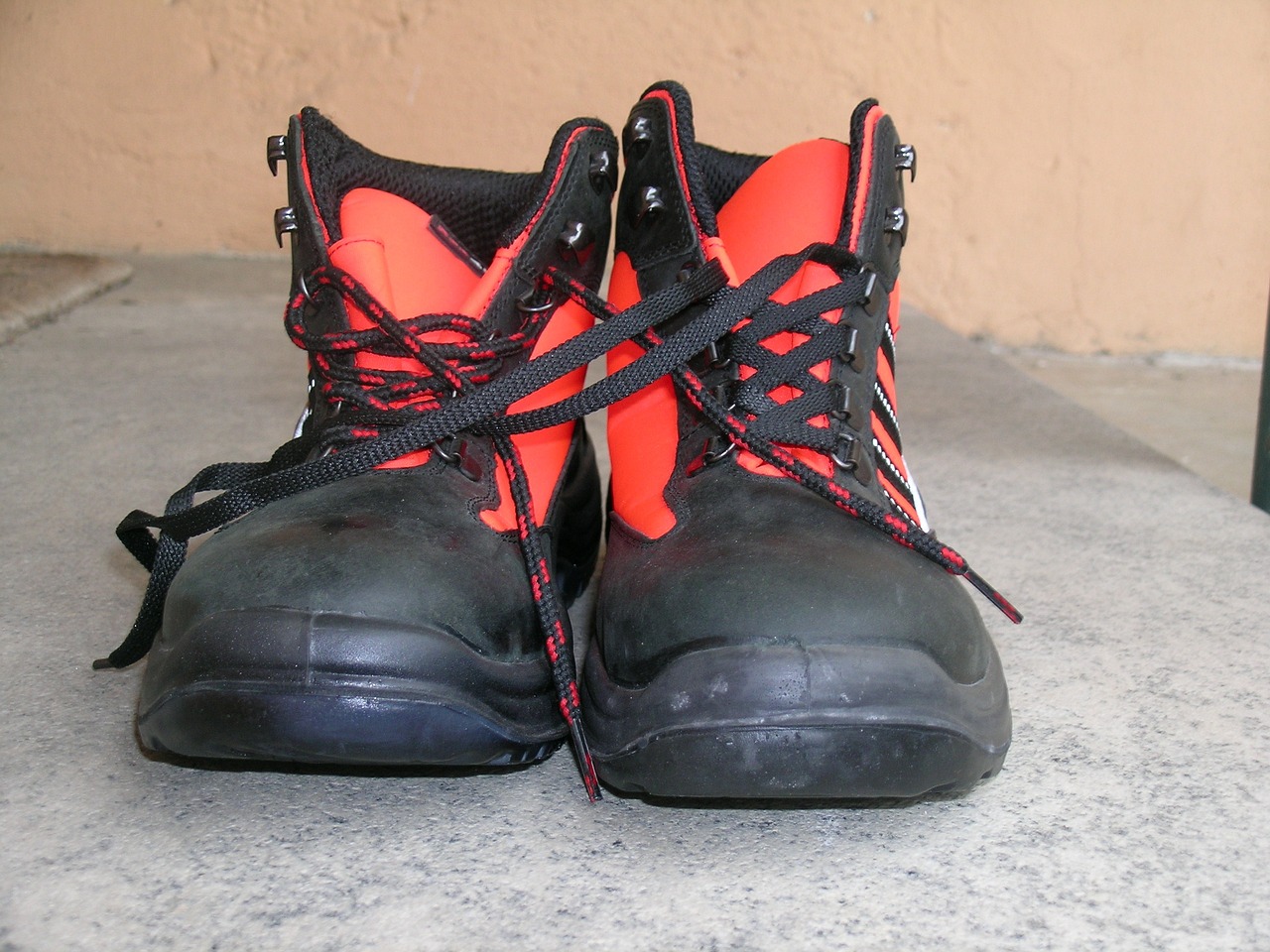
Recognizing Symptoms of Illness
As a responsible pet owner, being able to recognize the symptoms of travel-related illnesses is absolutely crucial. Imagine you're on a road trip, and your furry friend suddenly seems off. It's like trying to decipher a secret code; the sooner you crack it, the better the outcome for your beloved pet. Understanding the signs of distress can be the difference between a minor issue and a serious health concern.
Pets, like humans, can exhibit a range of symptoms when they're not feeling well. Some signs are subtle, while others might be more pronounced. Familiarizing yourself with these symptoms can empower you to act quickly and effectively. Here are some common symptoms to watch for:
- Loss of Appetite: If your pet suddenly refuses to eat, it could be a sign that something is wrong.
- Vomiting or Diarrhea: These are often immediate indicators of gastrointestinal distress and should not be ignored.
- Lethargy: If your pet is unusually tired or inactive, it may indicate an underlying health issue.
- Excessive Thirst: Increased thirst can signal dehydration or other health problems.
- Coughing or Sneezing: Respiratory issues can arise during travel, especially in new environments.
Recognizing these symptoms early can be a game-changer. For instance, if your dog starts to cough after a visit to a dog park, it might be a sign of kennel cough, a contagious respiratory disease. Similarly, if your cat is unusually withdrawn, it could be feeling the effects of stress from travel. The key is to be observant and proactive.
But when should you seek veterinary care? Knowing when to act is just as important as recognizing symptoms. If your pet exhibits any of the above symptoms for more than 24 hours, or if they seem to be in pain, it’s time to consult your veterinarian. Quick intervention can often lead to better outcomes, so don’t hesitate to reach out for professional help.
In summary, keeping an eye on your pet’s behavior and physical condition during travel is essential. Just as you would monitor a child's health on a trip, your pet deserves the same level of care and attention. By being vigilant and informed, you can ensure that your travels are filled with joy and not overshadowed by health concerns.
Q: How can I tell if my pet is feeling unwell during travel?
A: Look for signs such as loss of appetite, vomiting, lethargy, or changes in behavior. If you notice any of these symptoms, it’s best to consult a veterinarian.
Q: What should I do if my pet shows symptoms of illness while traveling?
A: If symptoms arise, try to find a local veterinarian as soon as possible. In the meantime, keep your pet comfortable and monitor their condition closely.
Q: Are there specific vaccinations I should consider before traveling?
A: Yes, vaccinations can vary based on your destination. Consult your veterinarian for a tailored vaccination plan that suits your travel plans.
Q: How can I reduce travel-related stress for my pet?
A: Ensure your pet is comfortable in their carrier, take regular breaks during long trips, and bring familiar items like their favorite blanket or toy.
Common Symptoms to Watch For
When traveling with your beloved pet, it's essential to stay vigilant and recognize any signs that they might be feeling under the weather. Just like humans, pets can exhibit a variety of symptoms when they are unwell, and being able to identify these early can make a world of difference in their health and comfort. Some common symptoms to watch for include:
- Vomiting: If your pet starts to vomit, it could be a sign of stress, motion sickness, or even a more serious underlying issue.
- Diarrhea: Loose stools can indicate dietary changes, anxiety, or infections that may require veterinary attention.
- Lethargy: If your pet seems unusually tired or disinterested in their usual activities, it might be a red flag.
- Excessive scratching or licking: This could indicate allergies or the presence of parasites, which are more common in unfamiliar environments.
- Changes in appetite: A sudden increase or decrease in your pet's eating habits can suggest discomfort or illness.
It's important to remember that these symptoms can vary significantly among different pets. For instance, while a dog might show signs of distress through barking or whining, a cat may simply withdraw and hide. Therefore, understanding your pet's normal behavior is crucial. If you notice any of the above symptoms, don't hesitate to consult your veterinarian. Prompt action can lead to quicker recovery and a happier pet.
Additionally, keep an eye out for other signs such as changes in breathing patterns, unusual thirst, or any signs of pain. If your pet is exhibiting multiple symptoms or if any one symptom persists, it's best to err on the side of caution and seek professional help. Your furry friend relies on you to be their advocate, especially during travel when they might be feeling more anxious or vulnerable than usual.
In summary, being proactive about your pet's health during travel is essential. By recognizing these common symptoms early on, you can ensure that your pet remains as comfortable and healthy as possible, allowing both of you to enjoy your adventures together without unnecessary stress.
Q: What should I do if my pet shows signs of illness while traveling?
A: If your pet exhibits any concerning symptoms, it’s crucial to seek veterinary care as soon as possible. Look for the nearest veterinary clinic or animal hospital in your travel area and contact them for guidance.
Q: How can I prevent my pet from getting sick during travel?
A: To prevent illness, ensure your pet is up-to-date on vaccinations, administer any necessary preventative medications, and maintain good hygiene practices during your trip. Regularly monitor your pet for any signs of distress or discomfort.
Q: Are there specific symptoms that indicate a serious issue?
A: Yes, symptoms such as persistent vomiting, severe diarrhea, difficulty breathing, or signs of pain should be taken seriously. If your pet shows any of these symptoms, seek veterinary care immediately.
Q: Can stress from travel affect my pet's health?
A: Absolutely! Travel can be stressful for pets, leading to symptoms like vomiting or lethargy. Preparing your pet for travel and providing a comfortable environment can help mitigate stress.
When to Seek Veterinary Care
Knowing when to seek veterinary care for your pet can be the difference between a minor issue and a serious health crisis. As a pet owner, it’s essential to be vigilant and proactive about your furry friend's health, especially during travel when they might be exposed to unfamiliar environments and potential illnesses. If your pet shows any signs of distress, it’s crucial to trust your instincts. But what exactly should you look for? Here are some key symptoms that should prompt you to contact your veterinarian:
- Persistent Vomiting or Diarrhea: If your pet experiences vomiting or diarrhea that lasts more than 24 hours, it could lead to dehydration, which is particularly dangerous for pets.
- Unusual Lethargy: If your pet seems unusually tired or disinterested in activities they normally enjoy, it may be a sign of an underlying health issue.
- Loss of Appetite: A sudden change in appetite can be a red flag. If your pet refuses to eat for more than a day, it’s time to consult a vet.
- Difficulty Breathing: Any signs of labored breathing or coughing should be taken seriously and warrant immediate veterinary attention.
- Signs of Pain: If your pet is whimpering, hiding, or showing other signs of discomfort, it’s crucial to seek professional help.
In addition to these symptoms, keep an eye out for any changes in behavior or physical condition. For example, if your pet has a fever or exhibits unusual swelling, these could indicate an infection or other health concerns. Always remember that it’s better to be safe than sorry. If you’re unsure about your pet’s condition, don’t hesitate to reach out to your veterinarian for advice.
Another important aspect to consider is the timing of your travel. If you’re traveling to areas where certain diseases are prevalent, such as Lyme disease or Leptospirosis, make sure you’re aware of the symptoms associated with these illnesses. Early detection can make a significant difference in treatment outcomes.
In summary, being attentive to your pet's health and recognizing the signs that indicate they need veterinary care can help ensure a safe and enjoyable trip for both of you. Don’t wait for symptoms to worsen; if something feels off, trust your gut and consult a professional.
- What should I do if my pet gets sick while traveling? - If your pet shows any concerning symptoms, seek veterinary care as soon as possible. Look for local veterinary clinics or emergency animal hospitals in your area.
- Are there specific vaccinations required for traveling with pets? - Yes, certain vaccinations may be required based on your travel destination. Always check with your veterinarian before your trip.
- How can I prepare my pet for air travel? - Familiarize your pet with their carrier, ensure they are comfortable in it, and check airline policies regarding pet travel.
- What are the signs of dehydration in pets? - Symptoms include dry gums, lethargy, and loss of skin elasticity. If you suspect dehydration, seek veterinary care immediately.
Frequently Asked Questions
- What are some common travel-related illnesses for pets?
Pets can be susceptible to various travel-related illnesses, including kennel cough, leptospirosis, and parasites like fleas and ticks. Each of these can arise from exposure to new environments or other animals, making it essential to be aware of the risks.
- How can I prepare my pet for travel?
Preparing your pet for travel involves several steps: schedule a pre-travel health check with your veterinarian, ensure vaccinations are up to date, and pack essential supplies like food, water, and any medications. This will help ensure a smooth and safe journey.
- What vaccinations should my pet have before traveling?
Common vaccinations include rabies, Bordetella (kennel cough), and distemper. The specific vaccinations needed may vary based on your travel destination, so it's best to consult with your vet for tailored advice.
- What should I do if my pet shows symptoms of illness while traveling?
If your pet exhibits symptoms such as vomiting, diarrhea, or lethargy, it's important to seek veterinary care as soon as possible. Early intervention can make a significant difference in their recovery.
- How can I maintain hygiene for my pet during travel?
Maintaining hygiene involves regularly grooming your pet, cleaning their bedding, and ensuring proper waste disposal. Keeping your pet clean will help minimize the risk of infections and illnesses while on the road.
- Is it safe to travel with my pet by plane?
Yes, it can be safe to travel with your pet by plane, but it requires careful planning. Familiarize yourself with the airline's pet policies, prepare your pet for the journey, and consider using a comfortable and secure carrier.
- What are some safe transportation methods for pets?
Safe transportation methods include using a secure carrier for car travel, ensuring your pet is properly restrained with a seatbelt harness, and following airline guidelines for flying. Each method has its own best practices to ensure your pet's safety.

